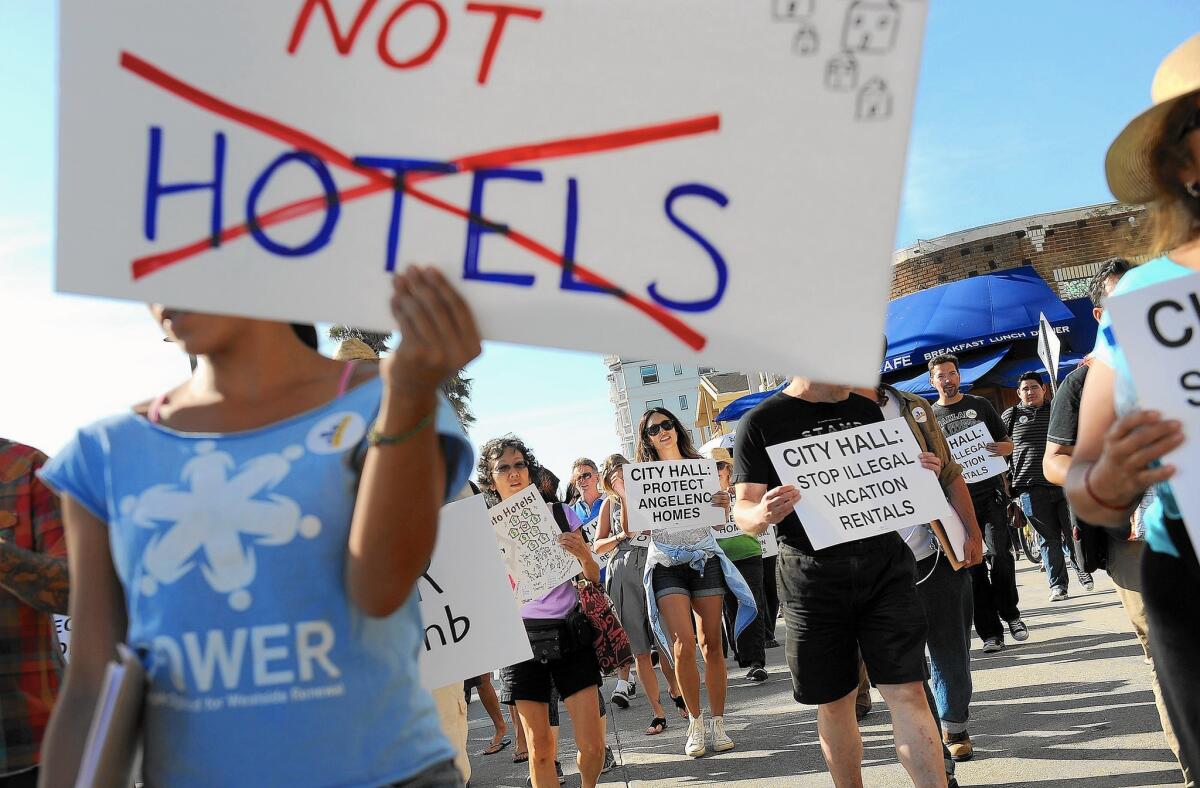In an email dated May 10, 2024 and released through a public records request, a staff member in Councilmember Traci Park’s office confirmed that the office was considering changes to Los Angeles’ Rent Stabilization Ordinance (RSO) that would allow short-term rentals in rent-controlled housing. The proposal would gut key protections for renters and invite landlords to convert long-term affordable housing into more profitable vacation rentals.

The email exchange began when a Venice homeowner asked if there was “any way to challenge an RSO designation” after discovering that their triplex could not legally be rented short-term. The homeowner wrote, “It feels punitive to tell us that we are not allowed to use our property as we see fit to help us pay our mortgage.” They compared it to being told “they can only be a taxi and not drive Uber becuase [sic] of a law that was decided on in the 70’s.”
Sean Silva, Councilmember Park’s Deputy for Planning and Land Use, responded that RSO units are not eligible for short term rentals under the current City laws. He relayed advice from Park’s planning deputy that “they always have the option of demo-ing their current building so that they would no longer be subject to RSO.”
He then added, “The team has seen many such issues and has presented us with some ideas for a longer-range, legislative fix to make it easier for people to participate in Home-Sharing through amending the ordinance. While that may be years away, we do want you to know that it is not set in stone.”
Although no motion to change the law has been introduced, the internal discussion reflects a dangerous willingness to undermine rent stabilization in favor of property owner flexibility. If implemented, such a change would give landlords a financial incentive to sidestep the RSO by turning rent-controlled units into short-term rentals, further eroding the city’s affordable housing supply.
This isn’t an isolated incident. Park has consistently aligned herself with landlord interests and opposed tenant protections throughout her time in office. On multiple occasions, she has voted against tenant relief policies supported by the vast majority of her colleagues. In early 2023, Park was one of just two councilmembers to vote against the city’s “eviction threshold” ordinance, which bars landlords from evicting tenants over debts less than one month’s fair market rent. She also opposed requiring landlords to pay relocation assistance after raising rents more than 10 percent and was the only “no” vote on providing a one-month grace period for tenants to pay late rent before facing eviction.
Park’s opposition to strong rent regulations continued into late 2023, when she voted against capping rent increases on RSO units at 4 to 6 percent, arguing, “We’ve already asked an awful lot of our mom-and-pop landlords, and I just can’t imagine how much more we’re going to continue to expect them to give.”
These votes reflect a broader policy agenda that consistently prioritizes landlords over tenants. In her first year in office, Park introduced a motion to create a Small Housing Provider Assistance Program, a city fund aimed at helping landlords with financial support. When tenants at Barrington Plaza, a 712-unit rent-stabilized complex in Park’s district, faced mass eviction under the Ellis Act, Park introduced a motion acknowledging the evictions and requesting updates, but she declined to intervene or challenge the legality of the evictions. Notably, the property owner had donated over half a million dollars to political committees supporting her campaign.
Park’s election campaign was heavily backed by the landlord lobby, including over $1.2 million in support from corporate landlords and real estate developers. Douglas Emmett, Inc., the firm behind the Barrington Plaza evictions, contributed $566,000 via an independent expenditure. The California Apartment Association, a major opponent of rent control, also spent more than $250,000 in support of Park’s election. She also accepted an $800 campaign contribution from Michael Cohanzad, a landlord notorious for evicting tenants from rent-stabilized apartments and re-listing them on Airbnb. In addition, Park took three contributions totaling $2,400 from Linda Berghoff, the wife of longtime lobbyist Arnie Berghoff, whose firm represents Airbnb in Los Angeles. Berghoff is one of the most prolific donors to City Council candidates and one of Traci Park’s largest individual contributors.
These ties to individuals who profit from or lobby on behalf of the short-term rental industry raise serious questions about Park’s motivations in considering amendments to the RSO that would allow Airbnb-style rentals in rent-controlled housing.
In that context, the May 10, 2024 email from her deputy is not an isolated remark. It is a reflection of how Park approaches housing policy. Rather than defend the integrity of the Rent Stabilization Ordinance, her office actively explored ways to roll it back to accommodate the demands of property owners. The fact that some of those property owners and lobbyist households have directly funded her campaign only heightens the alarm. The message is clear for the tens of thousands of renters who rely on the RSO to stay housed in an increasingly unaffordable city.

